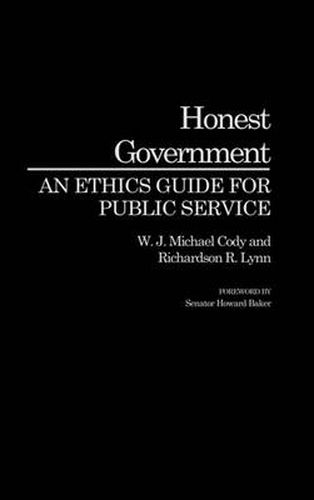Readings Newsletter
Become a Readings Member to make your shopping experience even easier.
Sign in or sign up for free!
You’re not far away from qualifying for FREE standard shipping within Australia
You’ve qualified for FREE standard shipping within Australia
The cart is loading…






This text addresses the need for a comprehensive statement of ethical behaviour for public officials and employees at every level of government in the United States. Recognising the need for legal reforms that focus mainly on campaign contributions, the authors examine the broader question of how we should measure the routine, day-to-day ethics of men and women in public service. By focusing more on attitudes and practices, the authors suggest that the highest standard of both ethics and competence should be demanded of all our public servants. The book identifies situations in which officials ought to act cautiously and presents the ethical rules that should be applied to each situation. The text presents a philosophy of public service and then moves to particular situations to which this philosophy must be applied: campaign finance; the campaign itself; behaviour of elected officials, appointed officials, and public employees; the role of lobbyists; compensation for public servants; moving to and from the public and private sectors; ethical guidelines for lawyers and judges; the private lives of public servants; and enforcement of ethics. The final chapter discusses the sometimes competing forces of ethics and competency. Ethical guidelines are gathered in the appendix and serve as a useful starting point for ethics in any public service setting. .
$9.00 standard shipping within Australia
FREE standard shipping within Australia for orders over $100.00
Express & International shipping calculated at checkout
This text addresses the need for a comprehensive statement of ethical behaviour for public officials and employees at every level of government in the United States. Recognising the need for legal reforms that focus mainly on campaign contributions, the authors examine the broader question of how we should measure the routine, day-to-day ethics of men and women in public service. By focusing more on attitudes and practices, the authors suggest that the highest standard of both ethics and competence should be demanded of all our public servants. The book identifies situations in which officials ought to act cautiously and presents the ethical rules that should be applied to each situation. The text presents a philosophy of public service and then moves to particular situations to which this philosophy must be applied: campaign finance; the campaign itself; behaviour of elected officials, appointed officials, and public employees; the role of lobbyists; compensation for public servants; moving to and from the public and private sectors; ethical guidelines for lawyers and judges; the private lives of public servants; and enforcement of ethics. The final chapter discusses the sometimes competing forces of ethics and competency. Ethical guidelines are gathered in the appendix and serve as a useful starting point for ethics in any public service setting. .